- Home
- Tracy Cooper-Posey
Once and Future Hearts Box One Page 2
Once and Future Hearts Box One Read online
Page 2
The other end of the snare was buried beneath a rock so heavy it would need two men to move it. Local hunters used rocks to weigh down their snares in this way. They would leave the snares in place for weeks at a time, while long grass grew up around the edges of the rock, beckoning prey to nibble upon it.
The man must have struggled hard to yank the snare so tight. The rain made it impossible to ease open the snare.
“I dropped my knife and sword when the snare tripped me,” he explained. His voice was strong and confident. “I won’t hurt you,” he added.
A dim shadow cast over them, then Vivian dropped next to Lynette and studied the man, her hand on her knife.
He stared back at her, a faint surprised expression in his eyes.
Lynette had seen many men stare at the princess in that way and hid her smile. Poets had written verse about Vivian’s beauty and kings and princes from far and wide had sought to marry her.
Her father, Gwilym, had refused them all.
“It isn’t for lack of fortune,” Vivian had explained to Lynette when the last king had been sent away with his head down. “They are all as rich as anyone can be, these days. It is their political affiliations my father objects to.”
Where King Gwilym’s true loyalties lay, no one knew for sure. He paid lip service to High King Vortigern, as did everyone, yet remained vague about sending troops to aid Vortigern’s efforts against the Saxons, despite his sons railing at him to let them fight.
Lynette had learned upon her arrival at Gwilym’s palace a year ago to step delicately around the subject of allegiances and the High King. Vivian remained unwed, offering hope to neighboring leaders. As long her father did not pursue a match for her, there was no need for formal alliances that could not be broken later. While she was unwed, his loyalties did not have to be declared via a joining of houses through marriage.
In the meantime, Vivian bewitched every man who saw her. She was a Celtic beauty, with raven black hair, eyes that matched and clear fine skin. Her brows were two sweeping arches and her chin fine and pointed. Most men, when they saw her, missed the firm line of her jaw and the furrow that was quick to appear between the elegant brows.
The snared man blinked, absorbing the impact of her appearance. He waved toward his ankle. “Will you free me?” he asked Vivian.
“We don’t know him,” Lynette said. “Look, he has a good sword and boots and that cloak is no simple war cloak.” There was little else she could see beneath the cloak. However, the wrappings above his squeezed boot were leather, not torn linen. The boot itself was sturdy, thick leather, with a solid sole and leather lacings. He wore bronze wrist guards about both wrists. “Why would he drop his knife and sword when he fell, if they were in his belt?”
Vivian looked at the man, raising her brow.
“Yes, I was holding them,” the man said with a touch of impatience. “I almost walked into the middle of an encampment of soldiers last night and backed away with my blades out. I kept them out, while I looked for shelter from the rain.”
It was a reasonable explanation. Soldiers, particularly the High King’s men, were inclined to act first, only asking for explanations later.
“There are king’s men on the road?” Vivian asked, her tone sharp.
“I did not say they were Vortigern’s people,” the man replied, his tone matching hers.
Lynette rolled her eyes. “Then it might have been anyone. Or no one at all.”
The man sighed. “There is a simple way about this. Take my sword and knife and toss them far out of reach. Then cut the snare. Then leave, before I can reach them.”
Vivian plucked her knife from her belt. “I judge you to be as harmless as any rabbit.”
“Vivian, no,” Lynette breathed. She shifted back on the grass and snatched up the knife and sword. She held them beneath her cloak. They were solid, heavy things. The sword’s hilt was inlaid with a great green jewel and wrapped with gold wire. It was no simple soldier’s tool.
Vivian ignored Lynette’s protest. She sawed at the leather about his ankle. Even with a sharp blade, the leather was reluctant to separate. Then, with a wet snap, it loosened and fell.
Almost as if the rain had been waiting for that moment, it stopped with a suddenness that made all three of them lift their chins and look up at the sky, startled.
The man laughed. There was a wary note in his chuckle.
Lynette pulled Vivian away, out of the man’s reach, as he stood and shook himself off. He stamped the foot that had been trapped and wriggled the ankle, testing it. He was taller than Lynette had guessed.
They waited warily while he assessed himself. Then he squared his shoulders. “You have my thanks. Now, if you will point me toward my weapons, I will collect them and go.”
Lynette glanced at Vivian. The princess nodded, raising her knife to a more useful height, in case he tried to attack them, after all.
Lynette lifted her hand, displaying the knife and sword.
“Ah.” He took a step toward her, then his knees buckled and he sank to the ground, one hand held out to save himself.
Vivian leapt toward him and pushed at his shoulders to straighten him and prop him up.
“I feel…strange,” he said, his voice distant. A great shiver wracked his body.
Lynette lowered the weapons as Vivian pulled the hood off the man’s head and rested her fingers against his high forehead. His hair was black and short…and wet. The fine cloak had been no protection through the long, rainy night.
“He is far too hot,” Vivian declared.
“We should take him back to the palace. The physician will be here tomorrow,” Lynette said.
“No physician,” the man said. “No towns.”
“No king’s men, either, I presume,” Lynette said dryly.
The man gave another violent shiver.
“The hermit’s cave is up at the top of this hill,” Vivian said. “We can leave him there. I have herbs that will heal him. I can bring them back. Help me, Lynette.”
It was the same flat tone Vivian had used to announce she wanted to ride, this morning.
Lynette wanted to protest. They should not be helping this man. He avoided kings’ men, travelled well-armed and didn’t want to be seen by ordinary folk. To help him would entangle them in the danger that followed him.
Only, Vivian had made up her mind.
She was normally highly cautious of being seen as anything other than a loyal daughter. Sometimes, though, the way she had of glimpsing the future directed her to foolish and risky acts.
This seemed to be one of those times.
Vivian’s gaze held Lynette’s, willing her to help.
Lynette didn’t quite sigh. She enjoyed a close friendship with the princess, yet she was still in service to her and sworn to obey her. Vivian’s unmoving stare was a reminder of that obligation.
Lynette threaded the sword and knife through her pony’s saddle cloth, then bought both ponies closer to where Vivian held up the man. His head was hanging forward, although he was not unconscious. He helped them get him up into Vivian’s saddle and held himself in it while they coaxed the reluctant ponies up the sharp slope to the summit.
While Vivian led the ponies, Lynette collected wood, carrying it in a fold of her cloak.
As they walked, a watery sun emerged from a break in the clouds and the gray day turned into one of rain-washed colors. It was March. Daisies and foxgloves, bluebells and primrose were lifting their buds to the sun. Swifts and sandpipers called from the higher branches of the trees.
A merlin gave a harsh cry as it dove straight down, its talons spread, and speared its prey.
The reminder was not wasted. Lynette stopped gathering wood and watched behind and around her. They were a good way from the town and it was not unknown for Saxons to move this far west in their search for land and food and sometimes, simple conquest.
The cave was empty. No one had lived in it for many years despite it being an exce
llent shelter. There was even a small spring at the front, seeping up from among the rocks at the mouth. The water was pure and cool.
Vivian and her women had delighted in telling Lynette the story of the haunted cave. The ghosts of those who lived and died there lingered. The last man to use the cave had gone mad. True, he had lived alone for thirty years, which might be enough to make anyone mad. Yet the townsfolk of Maridunum were convinced it was the fault of the ghosts whispering in his ears all those years.
Vivian helped the man down from the saddle. He leaned on her and shuffled into the cave. Lynette followed.
The sandy floor was even, the cave itself a rounded oblong, deeper than it was wide. The air was crisp with a chill more biting than the cold of the rain outside.
“I’ll get a fire going,” Lynette said, moving toward a ring of blackened flat stones in the middle of the cave with her armful of wood.
Her voice whispered, repeating itself, over and over, rising toward the craggy roof. Lynette froze, startled.
Vivian’s eyes were large, almost unfocused, as she met Lynette’s gaze. “Voices of the dead,” she murmured. Her voice ran on, too.
There was a soft stirring sound above their heads. The roof was dark with shadow. The shadow moved.
“Bats,” Lynette said.
“Bats that are used to humans. They won’t bother us,” Vivian replied. She guided the man over to a shelf of rock deepened and smoothed by previous residents to make a sleeping shelf.
Lynette dropped the wood into the old ashes and used her knife to shave off bark for kindling. A flint and striker sat on one of the flat rocks. No one wandering into the cave had dared take them, too frightened by the tales of vengeful ghosts to risk thievery.
In a few minutes, the fire crackled. She fed it the damp wood in stages, making it grow.
“Your cloak, Lynette,” Vivian said.
Lynette looked up from the flames. The man was lying on the shelf, now. Vivian’s cloak was beneath him. His own hung from a sharp projection on the wall, dripping. The sand beneath it was dark with water. The puddle spread.
Lynette slid her cloak from her shoulders and gave it to Vivian. Vivian spread it over the man. His eyes were closed. In the low orange light cast by the fire, Lynette could see sweat on his brow.
Lynette shivered at the cold touch of the air in the cave and rubbed her arms. The thin linen of her gown gave no warmth. She went in search of more wood. Instinct told her to look deeper inside the cave. It had been used by men for generations and where man ventured, he left his mark.
She found a cache of thick logs at the back of the cave, stacked neatly. Thick dust coated them. They would be dry enough to burn well. Pleased, she carried them back to the fire and dropped them onto the flames. By the time she returned with another armful, the fire leapt high and the cave filled with light. The air was already warmer.
Lynette stacked more wood next to the man’s shelf, within arm’s reach. He could tend the fire himself by tossing a log onto it when needed.
“Knife…” the man whispered and swallowed.
“I’ll get them,” Vivian said and walked outside. She came back and propped the sword against the shelf next to the wood. She handed the knife to the man. Lynette didn’t protest. He was incapable of tackling either of them.
Vivian looked down at him. “I’ll be back with medicine and food.”
“Thank you.”
Lynette moved to the mouth of the cave and waited.
“What is your name?” Vivian asked the man.
He took a moment to answer. “Emrys.”
“I will return, Emrys,” Vivian murmured.
* * * * *
There was a trace of a path leading down from the mouth of cave, heading for the town. They mounted and let their ponies pick their way down, for they were sure-footed beasts, bred for hills like these.
“He might die before you return,” Lynette said.
“He will not.” Vivian’s voice was firm and distant.
“His clothes, the sword, his manners, his speech…he isn’t a simple villager trying to avoid entanglements with the military, Vivian.”
“I know.”
“I don’t believe Emrys is his name any more than you do. If we don’t know who he is, we cannot tell if he is a threat.”
“He isn’t a threat,” Vivian said.
“You know that?” Lynette asked. “I mean, in the way you have.”
Vivian had an uncanny way of seeing into the future. She often knew what would happen before it did. After serving her for a year, Lynette had become accustomed to Vivian’s predictions about the weather, the yield of a harvest, pregnancies and the sex of newborns. This matter with Emrys, though, was an altogether different sort of prediction.
Vivian stirred and shook herself, as if she was waking up. “I don’t need the Sight to tell you he is harmless. He will be for days now, while the fever has him. Mayhap I will steal his pretty sword for myself, for he could not stop me.” She laughed and kicked her heels. “I’m cold. Let’s hurry!”
Her pony snorted and broke into a gallop. They were on smoother ground. Just over the next rise, they would see the town laid out below them like the map Lynette had once seen, scratched into a wax slate.
Lynette urged her horse into a canter, then a reluctant gallop, following Vivian across the shallow dale.
They cantered up to the crest and came to a halt, looking down at Maridunum.
Lynette was used to the bustling towns and cities of the north. For a southern town, Maridunum was pleasing. It lay along the edges of the Towy. The water at the mouth was deep enough for the drafts of bigger ships. A harbor had been built that allowed ships to tie up right in the heart of the town. Three ships were berthed today, even though it was still only March. Their high prows and sterns jutted above the quay, for the tide was low.
There were four inns, a smithy and other shops opposite the quay, with houses behind them.
Perched on a flat, low crest looking down over the town was the king’s palace. It had once belonged to a Roman general, who had used the house as his summer residence. After the Romans left, the big house had fallen into disrepair. Now, the straight lines of its Roman heritage were only just visible, while many more lean-tos, stables and outhouses were built against its walls.
The original stout oak gates were still in place, although during the day they were left open, while Gwilym’s men guarded the coming and goings into the courtyard beyond.
From up here, the palace looked small. The red roof with the curved tiles ran on all four sides of the big courtyard. Smoke curled from chimneys and in the courtyard itself, Lynette could see grooms and boys working on horses. Women hung washing now the rain had stopped. Chickens roamed the yard freely.
It was called a palace, yet Lynette’s father’s house was a grander affair, with two stories and glass in the windows. Still, Gwilym was considered a strong king and many people looked to him for protection, which he had provided for over twenty years. Grandeur had not been the reason her mother had sent Lynette to this far distant court.
At the other end of the town was the monastery—a ramshackle collection of buildings surrounding the church. Between the monastery and the harbor lay the rest of the town. The expansion was only possible because of the strong, graceful bridge that had been built across the river seventeen years ago. Before then, everyone had been forced to travel twenty miles upstream to the ford.
Cutting through the center of the town, heading east, was the old Roman road to Lecarum and farther on to Caerleon, that the Romans called Isca. The road was still sound and wide enough for five men to ride abreast. The road had been built before the bridge and therefore ended here at Maridunum, although across the river there were more winding tracks and trails leading west.
There was movement on the road. Lynette heard the faint clod of hooves and jingle of harnesses. She narrowed down her focus upon the road, spotting movement. Details. “Soldiers…” she brea
thed and looked at Vivian.
Vivian nodded. “Then that much of his story was true. Can you see any shields or devices?”
Lynette peered again. “Not yet. When they turn to go up to the palace, I will.”
They waited, watching the large company of men and horses canter along the road. Their mail and the studs on their shields glinted in the light of the sun, which was almost at its zenith. It was too damp for their horses to kick up dust. There were over thirty men, with polished helmets and tall spears. The horses were all big, broad-chested animals, bred for war.
When they reached the river, the company wheeled and headed along the beaten earth track up to the palace itself.
“Square shields,” Lynette murmured. Saxons carried round shields.
“If they had been round, the alarm would have been raised a long time ago,” Vivian pointed out. “I can see…wait…yes.” She settled back on her horse. “The man in the middle, at the front. That is the new king from Calleva.”
“Mabon?” Lynette squinted, to distinguish details from this distance. “He’s short, isn’t he?”
“Or the man next to him is taller than usual,” Vivian replied. Her eyes were narrowed, too. Any man who saw her now would recoil, for Vivian’s expression was hard as she assessed the entourage below. All the sweetness vanished from her face as she juggled allegiances and loyalties and the meaning of Mabon’s arrival.
Lynette had learned much from Vivian about politics and the flow of power among men. She focused on the man to the king’s left, the position of power. He was tall. From here, she could see little of his face. She studied his shield, instead. “I don’t know that shield,” she murmured. “Do you?”
The company passed the burnt shell of the old smithy and turned to follow the track up the hill, slowing as the climb steepened.
“Black shield with a white hammer…” Vivian paused. “Fighting…war…battle.”
“Cadfael,” they both said at once.
“Cadfael the Black,” Vivian finished, with a satisfied air.
“Isn’t Cadfael Vortigern’s man?” Lynette asked.
“Sworn and loyal to a fault, they say.”

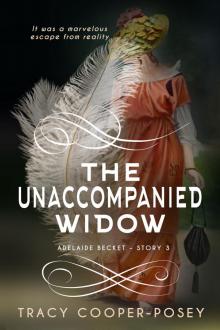 The Unaccompanied Widow
The Unaccompanied Widow Ashes of Pride
Ashes of Pride Inside Man
Inside Man Kiss Across Seas
Kiss Across Seas Kiss Across Chaos
Kiss Across Chaos But Now I See
But Now I See Scandalous Scions Two
Scandalous Scions Two Her Rebellious Prince (Scandalous Family--The Victorians Book 2)
Her Rebellious Prince (Scandalous Family--The Victorians Book 2)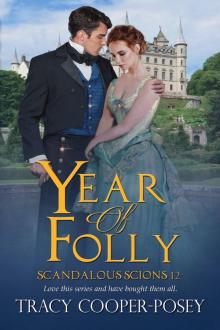 Year of Folly
Year of Folly Suns Eclipsed
Suns Eclipsed Quiver and Crave
Quiver and Crave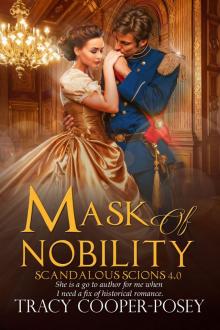 Mask of Nobility
Mask of Nobility The Second Trinity
The Second Trinity Kiss Across Tomorrow (Kiss Across Time Book 8)
Kiss Across Tomorrow (Kiss Across Time Book 8) Lost At Sea
Lost At Sea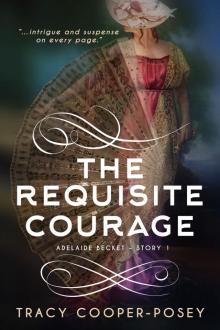 The Requisite Courage
The Requisite Courage Evangeliya
Evangeliya Risk of Ruin
Risk of Ruin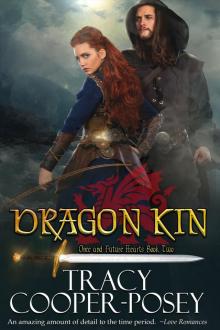 Dragon Kin
Dragon Kin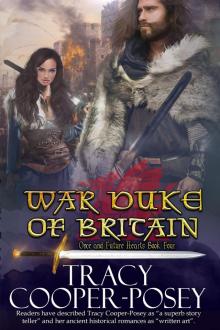 War Duke of Britain
War Duke of Britain Scandalous Scions One
Scandalous Scions One Degree of Solitude
Degree of Solitude Kiss Across Worlds (Kiss Across Time Book 7)
Kiss Across Worlds (Kiss Across Time Book 7)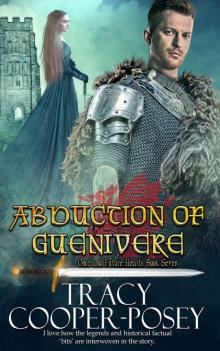 Abduction of Guenivere (Once and Future Hearts Book 7)
Abduction of Guenivere (Once and Future Hearts Book 7) Junkyard Heroes
Junkyard Heroes Flying Blind
Flying Blind Amor Meus
Amor Meus Heart Strike (Project Kobra Book 3)
Heart Strike (Project Kobra Book 3)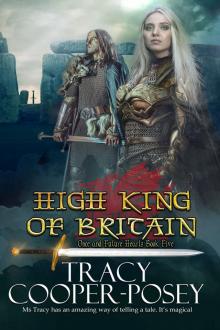 High King of Britain
High King of Britain Arctic Ambush
Arctic Ambush Romani Armada (Beloved Bloody Time)
Romani Armada (Beloved Bloody Time) His Parisian Mistress (Scandalous Family--The Victorians Book 1)
His Parisian Mistress (Scandalous Family--The Victorians Book 1)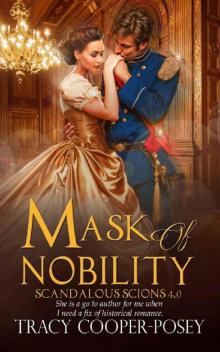 Mask of Nobility (Scandalous Scions Book 4)
Mask of Nobility (Scandalous Scions Book 4)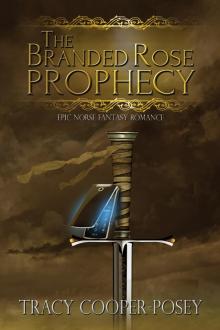 The Branded Rose Prophecy
The Branded Rose Prophecy Spartan Resistance
Spartan Resistance Byzantine Heartbreak (Beloved Bloody Time)
Byzantine Heartbreak (Beloved Bloody Time)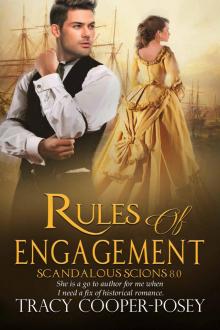 Rules of Engagement
Rules of Engagement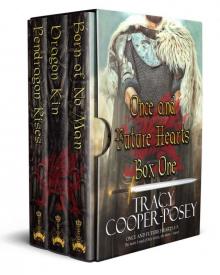 Once and Future Hearts Box One
Once and Future Hearts Box One Soul of Sin (Scandalous Scions Book 2)
Soul of Sin (Scandalous Scions Book 2) Time Kissed Moments 1
Time Kissed Moments 1 Blood Revealed
Blood Revealed Cat and Company
Cat and Company Byzantine Heartbreak
Byzantine Heartbreak Casualties of War
Casualties of War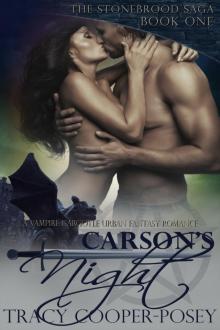 Carson's Night
Carson's Night Pendragon Rises
Pendragon Rises Terror Stash
Terror Stash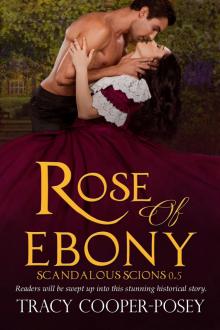 Rose of Ebony
Rose of Ebony Zoe's Blockade (Destiny's Trinities Book 5)
Zoe's Blockade (Destiny's Trinities Book 5) Blood Ascendant (Blood Stone Book 5)
Blood Ascendant (Blood Stone Book 5)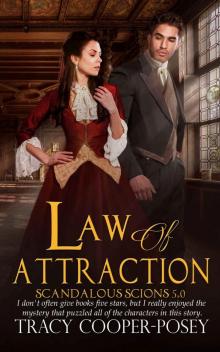 Law of Attraction
Law of Attraction Varken Rise
Varken Rise Blood Unleashed (Blood Stone)
Blood Unleashed (Blood Stone) Prisoner of War
Prisoner of War Vistaria Has Fallen
Vistaria Has Fallen Kiss Across Deserts
Kiss Across Deserts Terra's Victory (Destiny's Trinities Book 7)
Terra's Victory (Destiny's Trinities Book 7)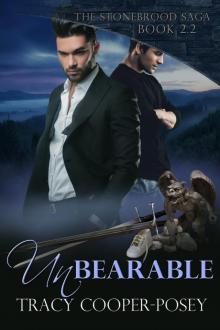 Unbearable
Unbearable Faring Soul - Science Fiction Romance
Faring Soul - Science Fiction Romance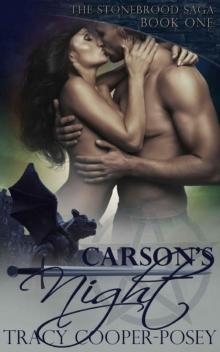 Carson's Night (The Stonebrood Saga)
Carson's Night (The Stonebrood Saga) Mia's Return
Mia's Return Kiss Across Swords (Kiss Across Time Series)
Kiss Across Swords (Kiss Across Time Series) Bannockburn Binding (Beloved Bloody Time)
Bannockburn Binding (Beloved Bloody Time) Beauty's Beasts
Beauty's Beasts Beth's Acceptance
Beth's Acceptance Kiss Across Kingdoms
Kiss Across Kingdoms Promissory Note
Promissory Note Blue Knight
Blue Knight Blood Stone
Blood Stone Season of Denial (Scandalous Scions Book 7)
Season of Denial (Scandalous Scions Book 7) Kiss Across Chains (Kiss Across Time Series)
Kiss Across Chains (Kiss Across Time Series) Yesterday's Legacy
Yesterday's Legacy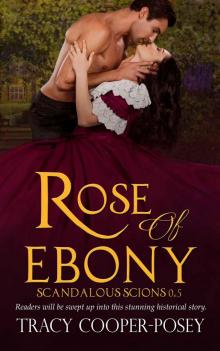 Rose of Ebony (Scandalous Scions Book 1)
Rose of Ebony (Scandalous Scions Book 1) Valor of Love (Scandalous Scions Book 2)
Valor of Love (Scandalous Scions Book 2) Hostage Crisis
Hostage Crisis Fatal Wild Child
Fatal Wild Child Octavia's War
Octavia's War Beth's Acceptance (Destiny's Trinities)
Beth's Acceptance (Destiny's Trinities) 5,001 - A Science Fiction Romance Short Story
5,001 - A Science Fiction Romance Short Story Freedom Fighters
Freedom Fighters Time and Tyra Again
Time and Tyra Again Harvest of Holidays
Harvest of Holidays Kiss Across Chains
Kiss Across Chains Sabrina's Clan
Sabrina's Clan Red Leopard (The Vistaria Affair Series)
Red Leopard (The Vistaria Affair Series)